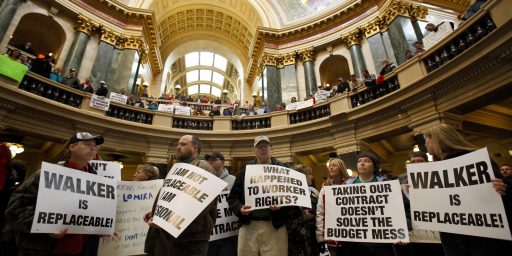Disaggregating the Conversation about Wisconsin
There are a lot of issues on the table, so to speak, in the WI situation. Here I try to entangle them a bit.
 As is often the case in politics, the issues at hand in Wisconsin are multiple which leads to discussions wherein one of the following (at least) happens: conflation of multiple issues into one, the privileging of one issue over others in a way that ignores key elements of the conversation, or the veering off the conversation into other issues not really on the table.
As is often the case in politics, the issues at hand in Wisconsin are multiple which leads to discussions wherein one of the following (at least) happens: conflation of multiple issues into one, the privileging of one issue over others in a way that ignores key elements of the conversation, or the veering off the conversation into other issues not really on the table.
To wit we have, conflation: the issue of whether teachers should have to pay more for their benefits should not be conflated with the issue of taking away their collective bargaining rights (while both are in the legislation, they are separate issues needing separate discussions*); privileging one issue over the other: making ending collective bargaining for Wisconsin teachers an ideological crusade when the real issue is supposedly a fiscal emergency; and veering: arguing about teacher compensation, i.e., are they paid too much or too little (which really isn’t the issue right here, right now).**
The situation in Wisconsin has multiple elements that can be broken down as follows:
1. The Actual Policy Issues
- The issue of whether Wisconsin teachers ought to increase the share they pay in benefits to help the state with its immediate financial crisis.
- Whether those same teachers ought to have their collective bargaining rights essentially removed.
- Whether those teachers will have their pay capped at the rate of inflation unless voters approve otherwise.
2. The Philosophical/Ideological Questions.
- The democracy question (both in terms of the election and the make-up of the legislature, but also the role of protests and such).
- Are unions good or bad?
- Should we consider private v. public unions as different types of entities, and if so can one be good while the other is bad?
- What is the value of teachers to a state (which addresses the pay issue specifically).
The longer this goes on, the more it seems that all of this is either getting mixed together in one big confusing mélange and/or one issue gets a lot of focus in a way that is out of proportion to the actual events at hand. And, I would add, I am likely missing something in my lists.
I would argue that while one has to deal rather heavily with list #2 in one’s discussion of list #1, it seems that a lot of the discussion has veered off from the legislative matters at hand which is what is going to eventually be voted on.
This is more an organizational post than anything else, but there are a couple of issues I want to address individually which I will do in additional posts.
Are there any glaring omissions in these lists?
—-
*Indeed, I would prefer them to be separate votes, for that matter, but that is a different issue.
**Yes, the overall theme is compensation, but not the philosophical question of whether teachers ought, or ought not, make a specific amount of money per year.






Steven,
But that is the plan by the Republicans, conflate the two so that most of the low information votes (Faux News) thinks its about budget deficits and compensation when its really about destroying the unions.
Its of course helped along by the “Sensible Conservatives” like James leading the way in conflating the two lists.
Speaking of low information, let’s not forget the net worth of the wealthiest 10% of Americans is twice as high as the net worth of the remaining 90% of Americans…it’s not like the Republican’s rich masters have been on a losing streak over the past decade.
“Are there any glaring omissions in these lists?”
Where on the list do insults and name-calling belong?
I think there are two additional issues of at least personal interest:
1. Agency (h/t/ jp): The Wisconsin Retirement System pays out retirement benefits partly based upon credits negotiated at the local level through collective bargaining. Should local government be able to increase statewide liability in this way?
2. Special interest lobying by public unions. Last year, Illinois enacted many of these same reforms (going forward), and here is the method utilized by an all Democratically-controlled government. The bill was put together in secret, it was introduced in committee at 10:00 a.m., it passed the committee, passed one house by 5:00 p.m., it passed the other house by 8:00 p.m. all on the same day. The public unions didn’t know what hit them. Is that how it has to be done?
I’ve linked to this before, but this is the legal analysis of the legislation I’ve relied upon in trying to understand the legal provisions. It’s not a polemic, but intended to provide advise on compliance if it is passed:
http://www.ruderware.com/documents/2011SpecialUpdate-CollectiveBargaining.pdf
Regardless of what the particular issues are this how now become a battle between taxpayer interests and the the interests of public employee unions. The entire nation is watching to see where the momentum will be when this clears.
Clearly early fears of what would happen if government allowed it’s employees to form unions and collectively bargain have come true. Unlike private sector unions the public sector unions have never had arms length negotiations with their employer. Those on the other side of the table are usually former workmates and colleagues and they are negotiating with a different set of interests than a private sector negotiator. Let’s not for get they are also negotiating with other people’s money.
Democracy? That happened back in November when the election was held. The Dems leaving town is an insult to Democracy.
ponce, so after you've eaten the rich, then what? Hey, at least I'll give you credit for distinguishing between wealth and income, even if that's not what the discussion is really about. Oh, and Democrats tend to be richer than Republicans these days, but don't let that get in the way of the narrative.
I would hope that those who are so mortified with the "incestuous" relationship that they imply exists between public sector unions and those they negotiate with would feel the same horror with the revolving door that goes on in Washington D.C., among other places, between politicians and lobbyists and all that "free speech" money poured into the trough from corporations and other high-powered interests…
"Democracy? That happened back in November when the election was held. The Dems leaving town is an insult to Democracy."
Democracy also happened back in 2006 and 2008…I don't seem to recall the same cries of an "insult" to democracy from the same quarters with the Republicans outrageous use of the filibuster in every way possible…
Loviatar – look! There's Elvis!
"ponce, so after you've eaten the rich, then what?"
Well, then you will be eaten, of course…
Steven T (as opposed to Steve P, who I'll get to in a sec), I just wanted to say that I really appreciate your (and James') ability to succinctly synthesize the issues as such (especially the succinct part). Really trying to cultivate those educator skills (and having a hard time).
As for Steve P, two points,
<p>Unlike private sector unions the public sector unions have never had arms length negotiations with their employer. Those on the other side of the table are usually former workmates and colleagues and they are negotiating with a different set of interests than a private sector negotiator.</p>
Outside of the largest/national Private unions, from my experience point one doesn't typically hold true. Second, could you explain what you mean by your second point?
<i>Democracy? That happened back in November when the election was held. The Dems leaving town is an insult to Democracy.</i>
I hope you feel the same way about the unprecidented (in scale) obstruction that the republicans enacted in the senate in terms of filibusters measured by cloture votes (112 last session, more than double the number from the year before, and just a little less than double the previous historic high). I'm sure you would agree that this was just as egredious an absue of the rules of an institution as preventing a vote by not showing up.
@CharlesA Oh, and Democrats tend to be richer than Republicans these days, but don't let that get in the way of the narrative.
Cite please?
"ponce, so after you've eaten the rich, then what?"
Rredistribute their stuff?
Hey at least your honest.
I'll have to search for the cite, but frankly I may not get to it for a while. Real life is intruding.
AIP, Using commonly accepted rules that allow a filibuster is far from fleeing a state to avoid the inevitible vote. Did Republicans go MIA or work within the rules that protect the minority. And yeah, I abhor the lobbyists and money involved in politics but that's caused by the size and scope of government. Smaller government has less lobbying and money influence.
Matt, My second point has to do with public sector managers being more interetsed in short term expediancy and avoiding a strike than the long term health of the state. I've seen it. They are generally concerned with little more than the current project they are working on and how far away retirement is.
The US Senate can change the filibuster rules but prefer to keep them. Don't blame members for playing by the rules.
@Steve P
And how is that different that folks in the private sector. From insider experience in a number of industries in crisis, I cannot tell you how common a strategy this is. Perhaps it's better in small businesses, but as soon as you get to middle and large corporations, the tendency is towards stability and ignoring rocking the boat.
The fact is that we are, across the board, addicted to short term gains over long term stability. And, most large orgs are far better at publishing defeat than they are at rewarding victory.
And as far as the Filibuster vs leaving, the arguement can be made that those dems are "playing by the rules" — change the voting regs if you don't like them. Not saying I agree with the move, but the idea that "politics is a dirty game" sets us on this sort of slope. And I'm guess this isn't the first time that strategy has played out (though it's hard to think of a more nuclear option).
@Plunk
"Did Republicans go MIA or work within the rules that protect the minority. "
On that (general topic — fleeing), see, Jonathan Adler, When Senate Republicans Went AWOL — and read the comments. Evidently, absquatchulation — an attempts to thwart it — is a time-honored tradition in our country, extending back to before we were a country:
And BTW,
@Plunk
"Regardless of what the particular issues are this how now become a battle between taxpayer interests and the the interests of public employee unions."
Uh, maybe not. The guv, I think, has overplayed his hand. When the union said, we will accept the fiscal parts of your proposal if we can keep our collective bargaining rights, and the guv responded, essentially, fvck that, he shifted the debate — and not in a direction favorable to him. He's coming across as a hard-line ideologue not willing to compromise. This is not going down well.
There is a variation on this theme out in Los Angeles:
"Pensions may be a favorite perk of public employment, but the spiraling costs of retiree benefits could bankrupt the city of Los Angeles. Now is the time to curtail overly generous public employee benefits. Measure G on the March 8 ballot is an important step toward reform.
We encourage a "yes" on Measure G, which would scale back retirement benefits for newly hired police officers and firefighters. Measure G does not affect civilian pensions, which can be changed for new hires by the mayor and City Council. Police and fire pensions can only be altered by a vote of the people.
The plan would reduce pension payments by 10 percent for firefighters and police officers who retire with fewer than 20 years of service. The idea is to keep people on the job and paying into the pension system longer, which will save taxpayers money. In addition, all new hires would, for the first time, pay 2 percent toward the cost of retiree health care. This is an important addition since the cost of health care is rapidly rising.
Currently, employed officers and firefighters would not be affected by Measure G – although the city is in negotiations with their unions to seek some cost savings on their retirement packages.
Pension costs could consume one-third of the city budget within five years, so it's absolutely essential that Los Angeles leaders and public employee unions cut retirement expenses. Otherwise, we could end up cutting the number of firefighters"
http://www.dailybreeze.com/ci_17455381
Interesting right? I believe there are unions, but benefits can only be changed by voters.
A tangled system.
The "indent" function seems to work as you edit, but not in the post.
sam, are you advocating vigilante justice now to forcibly kidnap and drag the Democratic legislators who have abandoned their posts back to the Capitol? Do two wrongs make a right? Also, what year was that? Can we go back to the federal level of spending that existed then?
Policy Issue: We're broke. End of discussion.
Philosophical/Ideological: Even FDR knew publik sektor unions are inimical to the common good.
d(^_^)b
http://libertyatstake.blogspot.com
"Because the Only Good Progressive is a Failed Progressive"
And there's a sign that someone's open to an actual discussion… 🙂
@Charles
"sam, are you advocating vigilante justice now to forcibly kidnap and drag the Democratic legislators who have abandoned their posts back to the Capitol? "
Seriously, Charles? You think mentioning an event that happened when the constitution was being ratified is advocating vigilante justice?
Oh, and
"Can we go back to the federal level of spending that existed then?"
Sure, if you want to disband the armed forces.
sam, you raised it as a comparison, not me.
“Policy Issue: We’re broke. End of discussion.”
Ok, so when do we drastically scale back the military, take an enormous bite out of Social Security, Medicare, and Medicaid, and raise taxes so that we are no longer broke? Unless you think it can all be done by cutting foreign aid and the Department of Education, and making all the tax cuts permanent…
@An Interested Party
Miltary: I’m a “Rumsfeld small-bootprint” guy (vice a “Powell shock and awe” guy), so I think we could agree on some scaling back – though your use of the term “drastic” suggests you are more inclined toward appeasement than I am.
SS/Medicare/Medicaid: Yep. It’s all an unsustainable Ponzi scheme. Let’s tackle it before it kills the society.
Raise Taxes: In a comatose economy? AYFKM?
amazing. I note that 1/3 of LA city budget goes to pensions (and growing), and AIP says scale back the military.
does he really think that is a fix?
john personna, when the only tool you have in your toolkit is military spending, every problem better have a nail.
since I live in a state with strong Democratic majorities, this partisan name-calling sounds like transmissions from another world. Here, it’s one wing of the Democratic party worried about pensions and the ability to maintain government services against another wing of the same party that’s not worried, but both of which are afraid of the public employees union.
For example, here is a constitutional amendment being proposed by the Democratic House majority leader:
“require local units of government (school districts, municipalities) to pass by a vote of 3/5th any collectively bargained contract, ordinance, or resolution that would impact the calculation of a retirement benefits.”
I’m assuming that sam, mantis and others believe this is an attempt to destroy the public unions because collective bargaining would be subject to referendum.
http://www.ieanea.org/media/HJRCA-62.pdf